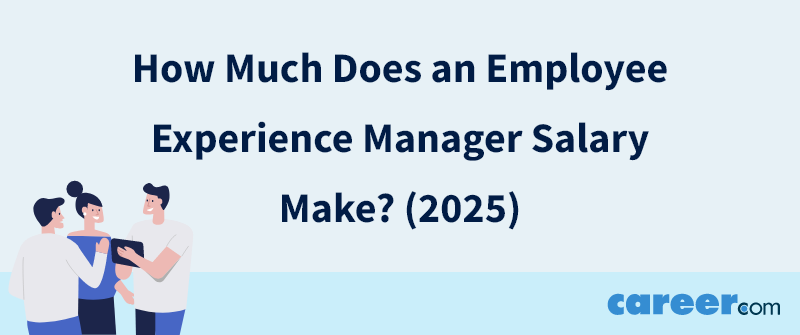How Much Does an Employee Experience Manager Salary Make? (2025)

Employee Experience Manager is a role in modern organizations that is responsible in ensuring a positive employee experience, fostering employee engagement, and strengthening company culture. By focusing on meaningful interactions, employee feedback, and internal communications, these managers are responsible for driving workplace satisfaction, productivity, and long-term business success.
As of August 27, 2025, the average annual salary for an employee experience manager in the United States is approximately $121,890. This guide walks you through national and regional salary breakdowns, how experience impacts pay, and practical strategies to increase your earnings as an employee experience manager.
What is the Average Employee Experience Manager Salary?
As of August 27, 2025, an employee experience manager reported a yearly salary of $121,890 per year. Salaries typically range between $104,696 and $142,332, depending on factors such as experience, employment location, company size, industry, and specific job responsibilities.
Employee Experience Manager Salary: $121,890 per year ($59 per hour)
The average monthly salary for Employee Experience Managers is about $10,158, with a weekly salary of approximately $2,344. The hourly wage for this role averages around $59. For those seeking additional salary insights.
| Percentile | By Hour | By Week | By Month | By Year |
|---|---|---|---|---|
| 10th Percentile | $50 | $2,013 | $8,725 | $104,696 |
| 25th Percentile | $54 | $2,171 | $9,408 | $112,890 |
| 50th Percentile | $59 | $2,344 | $10,158 | $121,890 |
| 75th Percentile | $64 | $2,550 | $11,049 | $132,590 |
| 90th Percentile | $68 | $2,737 | $11,861 | $142,332 |
Employee Experience Manager Salaries State by State
The employee experience manager salary can vary significantly by state, influenced by cost of living, local demand for HR and engagement leaders, and company size. The District of Columbia offers the highest average salary for employee experience managers at $134,890 per year, while Mississippi reports one of the lowest at $108,690 per year.
Major states like New York (NY) and California (CA) consistently rank among the highest-paying states, making location a critical factor when professionals review and verify salary expectations before proceeding with career decisions.
| State | Average Salary |
|---|---|
| Alaska | $131,890 |
| Alabama | $111,990 |
| Arkansas | $110,090 |
| Arizona | $118,690 |
| California | $134,390 |
| Colorado | $124,290 |
| Connecticut | $130,190 |
| District of Columbia | $134,890 |
| Delaware | $123,390 |
| Florida | $115,290 |
| Georgia | $117,490 |
| Hawaii | $127,390 |
| Iowa | $116,590 |
| Idaho | $113,790 |
| Illinois | $124,190 |
| Indiana | $116,990 |
| Kansas | $115,990 |
| Kentucky | $114,690 |
| Louisiana | $115,890 |
| Massachusetts | $132,590 |
| Maryland | $125,690 |
| Maine | $118,790 |
| Michigan | $119,990 |
| Minnesota | $124,690 |
| Missouri | $115,790 |
| Mississippi | $108,690 |
| Montana | $115,090 |
| North Carolina | $115,790 |
| North Dakota | $120,390 |
| Nebraska | $114,790 |
| New Hampshire | $123,190 |
| New Jersey | $132,090 |
| New Mexico | $112,890 |
| Nevada | $120,590 |
| New York | $129,590 |
| Ohio | $118,690 |
| Oklahoma | $112,690 |
| Oregon | $123,790 |
| Pennsylvania | $121,290 |
| Rhode Island | $126,290 |
| South Carolina | $114,190 |
| South Dakota | $110,790 |
| Tennessee | $113,890 |
| Texas | $118,890 |
| Utah | $116,690 |
| Virginia | $122,690 |
| Vermont | $119,590 |
| Washington | $132,090 |
| Wisconsin | $119,890 |
| West Virginia | $109,690 |
| Wyoming | $116,890 |
Best-Paying Cities for Employee Experience Managers
Similar to other HR and engagement leadership roles, the employee experience manager salary can vary widely by location, largely influenced by the cost of living, the strength of the local job market, and industry demand.
For example, as of August 27, 2025, San Jose, CA, San Francisco, CA, and New York, NY are among the highest-paying cities, with salaries for employee experience managers exceeding $141,000 per year.
| City | Average Salary |
|---|---|
| San Jose, CA | $153,690 |
| San Francisco, CA | $152,190 |
| Oakland, CA | $148,790 |
| New York, NY | $141,190 |
| Queens Village, NY | $140,290 |
| Paramus, NJ | $139,290 |
How Experience Affects the Employee Experience Manager Salary
Experience directly impacts the employee experience manager salary, with pay steadily increasing as professionals take on greater responsibilities in shaping company culture, driving employee engagement, and managing organizational programs.
At the entry level, employee experience managers typically earn about $118,532, while intermediate-level managers report salaries of around $118,935.
Moving up, a senior employee experience manager earns roughly $119,875, and at the specialist level, salaries rise to about $120,950. Finally, expert-level managers command the highest pay at approximately $123,008 per year.
| Level | Average Salary |
|---|---|
| Entry Level Employee Experience Manager | $118,532 |
| Intermediate Level Employee Experience Manager | $118,935 |
| Senior Level Employee Experience Manager | $119,875 |
| Specialist Level Employee Experience Manager | $120,950 |
| Expert Level Employee Experience Manager | $123,008 |
How to Increase Salary as an Employee Experience Manager
Here are five effective, fact-based strategies to increase earnings in this role:
- Work in the highest-paying cities: Relocating to major hubs like San Jose, San Francisco, or New York, NY can significantly raise compensation. These markets often have global companies competing for top talent, rewarding Employee Experience Managers who can design impactful programs and manage large-scale engagement initiatives.
- Advance to senior or expert roles: Salary growth comes with career progression. Moving from an entry-level to an expert-level Employee Experience Manager often involves overseeing larger employee populations, driving internal communications strategies, and leading organization-wide initiatives, all of which bring higher pay.
- Specialize in strategic EX programs: Professionals who focus on digital tools, employee engagement analytics, or culture transformation initiatives tend to earn more. Companies place a premium on managers who can connect human experience to measurable outcomes like retention, productivity, and business success.
- Negotiate total compensation packages: Beyond base salary, employee experience managers can negotiate for bonuses, equity, remote-work stipends, or professional development funds. Demonstrating the ability to verify results through employee feedback and satisfaction scores strengthens negotiating power.
- Invest in skills and qualifications: Pursuing certifications in employee engagement, internal communications, or organizational psychology directly impacts earning potential. Mastery of digital platforms like Microsoft Viva, Qualtrics EmployeeXM, or Culture Amp positions managers as critical to modern EX strategies, often leading to salary increases.
Employee Experience Manager Skills
Employee Experience Manager skills can vary, with DEIB expertise boosting salaries by up to 8.11%. Strong capabilities in employee engagement +8.04%, HR compliance +7.53%, and healthcare data privacy +7.51% also raise pay.
Meanwhile, skills in employee relationship management +7.24%, social media management +7.31%, and HR policies +6.92% support higher earnings. Even customer satisfaction +5.58% remains valuable for advancing in this role.
| Skill | Salary Increase (%) | Skill Demand (%) |
|---|---|---|
| Healthcare Data Privacy and Protection | +7.51% | 10.70% |
| HR Policies | +6.92% | 10.40% |
| Social Media Management | +7.31% | 10.30% |
| HR Compliance | +7.53% | 10.10% |
| Customer Satisfaction | +5.58% | 10.00% |
| Employee Relationship Management | +7.24% | 10.00% |
| Employee Engagement | +8.04% | 10.00% |
| Diversity, Equity, Inclusion, and Belonging | +8.11% | 10.00% |
What are the FAQs About Employee Experience Manager Salaries?
Here are the common questions asked about employee experience manager:
Are employee experience manager salaries affected by company size?
Yes. Larger companies often pay more because the role involves managing more complex programs, greater employee populations, and broader internal communications responsibilities.
Do employee experience managers earn bonuses in addition to base pay?
Many do. Compensation packages may include performance bonuses tied to employee engagement scores, retention rates, or successful implementation of workplace initiatives.
Are companies using AI to set salaries for employee experience managers?
Yes. In 2025, about 22% of companies already use AI for salary benchmarking, with another 63% planning to adopt it. These tools help verify pay equity, market competitiveness, and transparency.
Can certifications and additional qualifications increase pay?
Absolutely. Specialized training in HR analytics, DEIB (Diversity, Equity, Inclusion, and Belonging), or employee engagement programs can boost earnings by demonstrating advanced skills critical for business success.



